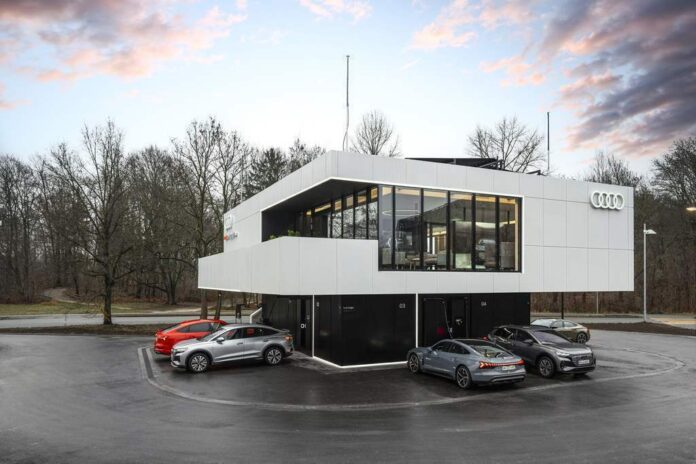With the continuously growing number of electric models, the demands made on charging infrastructure is increasing. Today at the exhibition center in Nuremberg, the first Audi charging hub is going into operation as the only charging concept of its kind in the world. The Audi charging hub opens for customers on December 23. The modern quick-charging station with reservable high-power charging areas is oriented toward, among other things, electric car owners who don’t have any charging opportunities at home. Moreover, the Audi charging hub is intended to serve future peak demand for charging in urban environments. A connected lounge area offers a premium charging experience.
With the pilot location, Audi is road-testing its new charging concept for the first time. “We want to use it to test flexible and premium-oriented quick-charging infrastructure in urban space,” says Ralph Hollmig, Audi charging hub project manager. “We’re going where our customers don’t necessarily wake up in the morning with a fully charged electric car and at the same time thinking about increasing charging demand in the future.”
Self-sufficient and affordable charging infrastructure
Cubes are the foundation of the Audi charging hub. The flexible container cubes can be assembled and disassembled again in existing areas in a few days. The cubes provide two fast-charging stations for each unit and can be combined in various constellations. Used and processed lithium ion batteries function as energy storage systems – what are known as second-life batteries taken from dismantled development vehicles. That reduces costs and resources. This makes complex infrastructure with high-voltage power lines and expensive transformers as unnecessary as time-consuming planning procedures. The Audi charging hub’s battery-storage solution will bring quick-charging infrastructure where the electric grid is not enough.
Thanks to the roughly 2.45 MWh of interim storage, the charging stations in Nuremberg only need a 200 kW green power connection to the low-voltage network that is already available, which is entirely sufficient for operating the Audi charging hub. The 200 kW are enough to continually fill the storage modules. Solar panels on the roof additionally provide up to 30 kW of green energy. Customers can charge electric cars with up to 320 kW of power at six charging points. A total of about 80 vehicles can be charged here per day without reaching the limits of the energy storage system’s capacity combined with the hub’s 200 kW power input.
The Audi e-tron GT1 reaches a charging capacity of up to 270 kW. That allows the four-door Coupé to charge enough energy for up to 100 kilometers in about five minutes. A charge from 5 to 80 percent takes roughly 23 minutes.
Prices like the Wallbox at home
Currently, anyone who chooses to use the high-power charging stations at the Audi charging hub in Nuremberg and have an e-tron Charging Service contract can charge for 31 cents per kilowatt hour, regardless of the rate. That makes the Audi charging hub a real alternative to charging at home. “We’re providing people in urban areas with charging at the price they would pay to charge using the Wallbox at home,” says Hollmig. The Audi charging hub in Nuremberg is an open charging site. The entrance area is even accessible for drivers of cars of other makes.

Audi customers can use the new reservation function in the myAudi app: they can easily book one of the six charging areas. Charging itself is quick and uncomplicated. With Plug and Charge (PnC), it is even possible to charge models with Plug and Charge functionality without an RFID (radio frequency identification) card at two of the six charging points during the pilot phase. The authentication process takes place automatically via encrypted communication as soon as the charging cable is connected to the vehicle. To use this system, drivers must have a PnC-capable model of the Audi e-tron series (Audi e-tron 50/55/S incl. Sportback derivatives with production date after calendar week 48/2021) and an active e-tron Charging Service contract. Customers can spend the 20- to 30-minutes it takes to charge up to 80 percent charging volume – for instance with an Audi e-tron or e-tron GT1 – in the upstairs lounge.
The tests that are starting in Nuremberg focus on the new reservation function, customers’ expectations of a premium charging experience, and technical aspects like the requirements for modern battery storage systems. Audi also wants to determine which times of day the facility is particularly frequently used. The goal is to establish the Audi charging hub with appropriate added value for customers. To that end, Audi is offering additional attractive services on-site beyond charging electric cars: an exchange station for electric bike batteries, an electric scooter lending service, information about various Audi products, as well as test drives in theAudi Q4 e-tron and RS e-tron GT2, supervised by Audi experts. Additionally, Audi offers a just-in-time delivery service for food, an upscale automat, and mobile car care.
Service staff look after customers In the roughly 200 square meter (2,153 sq. ft.) barrier-free lounge, which also includes a 40 square meter (431 sq. ft.) patio, users’ wellbeing takes center stage. There they can work and relax. On a 98 inch screen, Audi models can be configured or information about the Audi charging hub’s functionality or a car’s current charge level can be retrieved.
During the pilot project in Nuremberg, an employee will attend to visitors’ wishes between 10:00 AM and 7:00 PM. Six charging points and a lounge are available around the clock. “Our customers will share multiple benefits,” says project manager Hollmig. “With an exclusive reservation option, a lounge area, short idle time thanks to high charging capacity, and a novel swivel arm to simplify handling the charging cable.”


